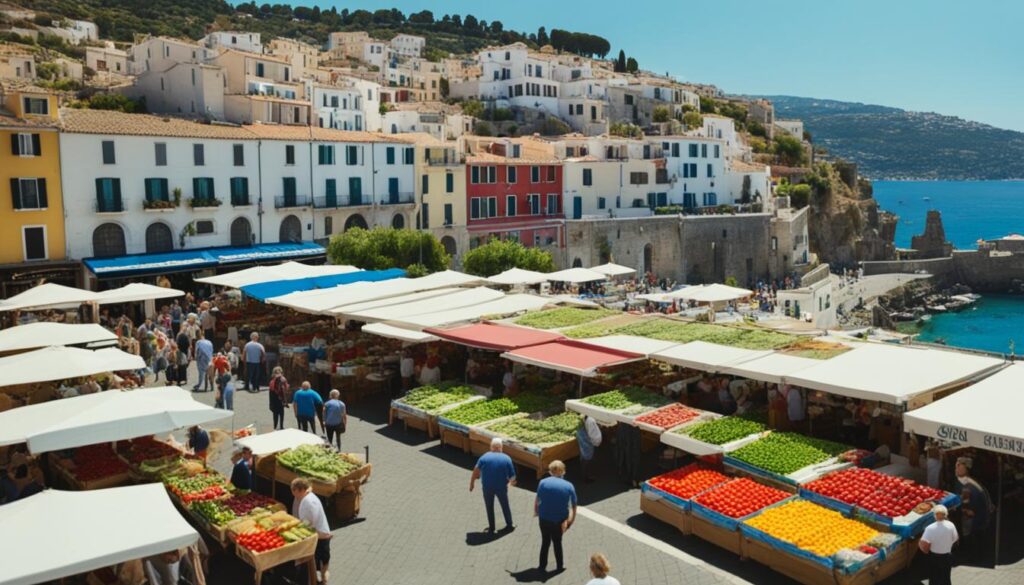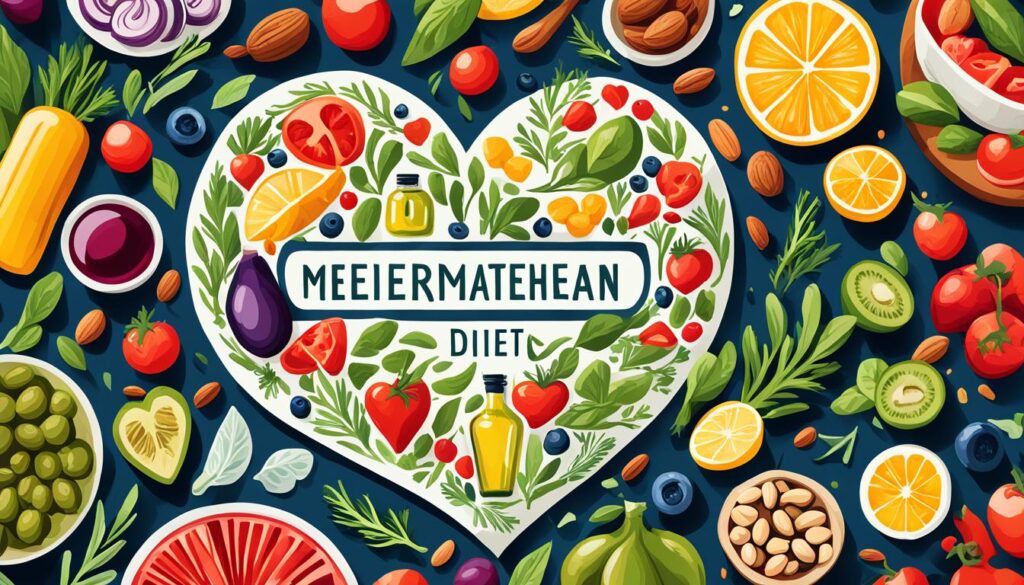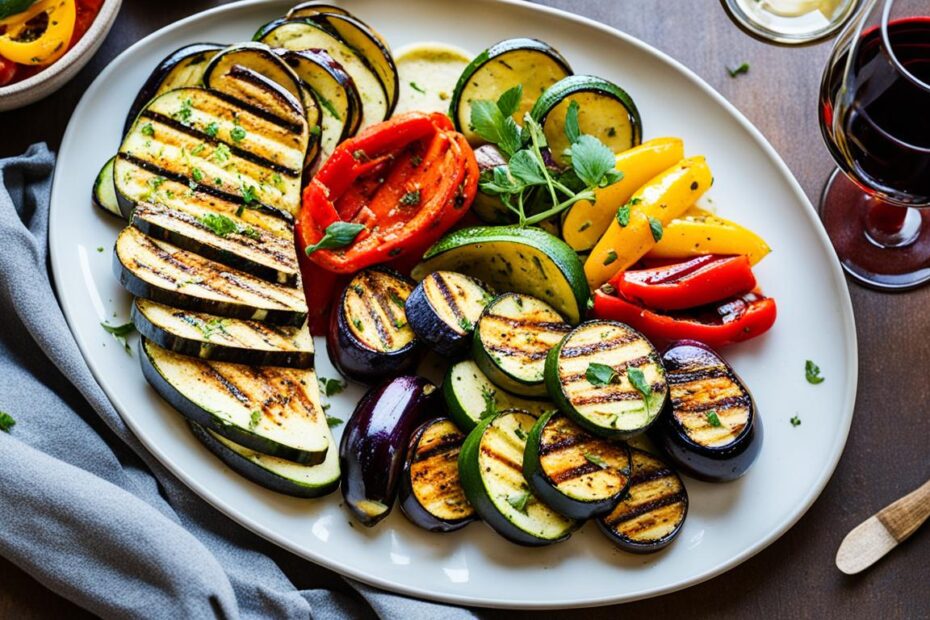Ever thought about what makes the Mediterranean diet so healthy and popular worldwide? It’s all about the tasty, good-for-you foods it’s made of. I, for one, love the Mediterranean way of eating. It has added joy and energy to my meals. Now, let’s find out what foods make this diet amazing.
Think about the colorful fruits and vegetables full of antioxidants. Then, there’s the good fats that keep our hearts strong. This diet is a goldmine of natural and yummy ingredients. If you want to try a new way of eating or just learn more, exploring the Mediterranean diet is a great start. Ready to find out the top foods for living the Mediterranean life and all its perks?
What is the Mediterranean Diet?
The Mediterranean diet is a way of eating based on countries near the Mediterranean Sea. It focuses on plants, healthy fats, and not too much meat. It’s all about eating lots of veggies, fruits, grains, beans, and olive oil. The main healthy fat source is olive oil. And people eat fish and seafood a lot.
It’s more like a pattern than a strict rule. You can adjust it to what you like and where you’re from. It says meals are best shared with others. Also, the diet is about enjoying food and moving your body. Drinking a little bit of red wine can be good for you too.
- The Mediterranean diet is based on the traditional eating patterns of countries bordering the Mediterranean Sea, such as Greece, Italy, and Spain.
- It emphasizes a plant-based approach, with a focus on vegetables, fruits, whole grains, beans, nuts, and seeds.
- Olive oil is the primary source of healthy fats, and fish and seafood are regularly consumed.
- Moderate portions of proteins from poultry and legumes are also included.
- The Mediterranean diet is not a strict set of rules, but rather a flexible way of eating that can be adapted to individual preferences and cultural traditions.
- The Mediterranean lifestyle also promotes the moderate consumption of red wine and the importance of shared meals and physical activity.

The Mediterranean diet is well-loved because it’s good for your heart, helps with managing weight, and lowers the risk of getting sick. It’s all about eating natural, healthy food and being active. This makes the diet a really good way to stay healthy without giving up on enjoying meals.
Benefits of the Mediterranean Diet
Heart Health Benefits
The Mediterranean diet can help your heart a lot. It focuses on good fats, whole grains, and foods with lots of antioxidants. This diet can make your heart stronger. It does this by lowering blood pressure, cutting down on swelling, and slowing down hardening of the arteries.
Many studies show the Mediterranean way of eating is great for your heart. People who stick closely to this diet are 25% less likely to have heart issues after 12 years. If you really follow this diet, you could lower your risk of heart problems and early death by around 24% to 23%.
This diet is good for your heart because it’s big on the right kind of fats, like in olive oil and nuts. It also has plenty of fruits, veggies, and grains that fight heart issues. These foods help keep your blood pressure and swelling down. They also slow down hardening of the arteries, lowering your risk of heart problems and stroke.
Also, eating a lot of seafood helps protect your heart. It’s full of omega-3 fats that are good for you. Omega-3s can lower your triglycerides, cut down on swelling, and make your heart work better. All of this guards against heart issues and stroke.
In short, the Mediterranean diet is packed with plant foods, the right fats, and enough protein and dairy. This combination is really good for your heart. It helps lower your chances of getting heart disease.

Core Components of the Mediterranean Diet
The Mediterranean diet focuses on plant-based foods and good fats. At its core are key parts that make it healthy. Let’s look at what makes this diet special.
The diet is mainly about eating plants. This includes vegetables, fruits, whole grains, legumes, nuts, and seeds. These foods are full of vitamins, minerals, and antioxidants. They keep our bodies strong.
Olive oil is very important in this diet. It is a healthy fat that helps our hearts. Olive oil fights inflammation. It is often used with fish and seafood. These also give us omega-3s, which are good for our health.
Drinking milk, eating chicken and eggs is part of the diet, but not a lot. It’s best to eat small amounts of these and to not have too much red meat. This keeps our diet well-balanced and lowers the chance of eating too many calories.
The Mediterranean diet is not just good for us; it is also tasty. It includes healthy plant foods and right amounts of animal foods. This makes it a good way to eat for our health.
Best Foods For Mediterranean Diet
Fruits and Vegetables
The Mediterranean diet loves fresh fruits and veggies. Think tomatoes, broccoli, and spinach. Don’t forget oranges, strawberries, and figs. These foods are full of good stuff like vitamins and antioxidants.
They bring lots of health benefits. Plus, they don’t have to be expensive.
- Tomatoes have the antioxidant lycopene.
- Broccoli is a fiber and vitamin powerhouse.
- Spinach is full of folate and iron.
- Oranges give you a boost of vitamin C.
- Strawberries help your immune system and have fiber.
- Figs are sweet and packed with fiber and minerals.
Whole Grains
The Mediterranean diet also likes whole grains. This means foods like whole wheat bread and brown rice. They also include quinoa and oats. These grains have fiber and provide good carbs. They can help steady your blood sugar and keep you feeling full.
Here are some cost-effective whole grain choices:
- Whole wheat bread. It’s great for sandwiches and toast.
- Brown rice is full of nutrients and a good white rice alternative.
- Quinoa has a lot of protein and is simple to add to meals.
- Oats are perfect for a heart-healthy breakfast or baking.
Eating these whole grains is great for your wallet and your health. If you want more Mediterranean diet recipes, visit The Mediterranean Dish.
Healthy Fats in the Mediterranean Diet
The Mediterranean diet loves its healthy fats. They are very important in this way of eating. Extra virgin olive oil and nuts and seeds are key. These foods help keep your heart and body strong.
Olive Oil
Extra virgin olive oil is key in the Mediterranean diet. It’s full of good monounsaturated fats. You can use it in cooking, on salads, or as a bread dip. This makes your food tasty and good for you.
Olive oil is also packed with polyphenols, which fight bad stuff in your body. They help lower cholesterol and keep your heart healthy. Using olive oil often can reduce the chance of getting heart problems.
Nuts and Seeds
In the Mediterranean diet, nuts and seeds are encouraged. Think almonds, walnuts, hazelnuts, sunflower, and pumpkin seeds. They are full of good fats. Plus, they offer a lot of fiber, vitamins, and minerals.
These unsaturated fats in nuts and seeds are great for your heart. They can lower bad cholesterol. Plus, they have lots of antioxidants to keep you healthy. Remember, these foods are a big part of the Mediterranean diet.
Adding olive oil, nuts, and seeds is super important. It makes the Mediterranean diet not just healthy, but tasty too. This is good for your health and feeling well overall.
Proteins in the Mediterranean Diet
The Mediterranean diet says lean proteins are key for a healthy meal plan. This not only helps your heart but also keeps your weight in check. Let’s look at the main protein foods in this way of eating.
Seafood and Fish
This diet highlights seafood and fish for their lean protein. Types like salmon and sardines have a lot of omega-3s, great for your heart. Eating these fish can lower your heart disease risk and improve your health.
Poultry and Eggs
Chicken, turkey, and eggs are important for protein in the Mediterranean diet. They are better choices than red meat because they have less unhealthy fat. Using these in your meals is a tasty and healthy way to get your protein.
Legumes: Beans, Lentils, and Peas
Beans, lentils, and peas are common in this diet. They offer a lot of fiber and important vitamins and minerals. You can add them to many meals, like soups and salads, for a nutritious boost.
The Mediterranean diet helps you get enough protein the right way. It promotes a wide variety of high-nutrient foods for your health and well-being. This way of eating makes sure your body has what it needs to be its best.
Meal Planning and Recipes
To follow the Mediterranean diet, plan meals with plant-based foods. This includes fruits, vegetables, and more. Also, add lean proteins like fish. Using olive oil as the main fat is a key step. It helps make your dishes tasty and healthy.
Eating with loved ones and staying active are also big parts of this diet. It’s not just about the food. It’s a whole lifestyle.
The Mediterranean way of eating is all about balance. It focuses on natural, whole foods. Make sure your meal plans mix veggies, fish, and other lean meats. Try things like egg bowls for breakfast and farro salads for lunch. These ideas keep your diet exciting and full of variety.
Having the right staples in your kitchen makes cooking the Mediterranean way easier. Keep items like olive oil, legumes, and spices on hand. Then, whipping up a tasty, healthy meal is fast and simple.
For more help, check out some Mediterranean diet meal plans. You can also find guides and easy recipes for beginners. This way, starting your Mediterranean diet adventure is simple.
